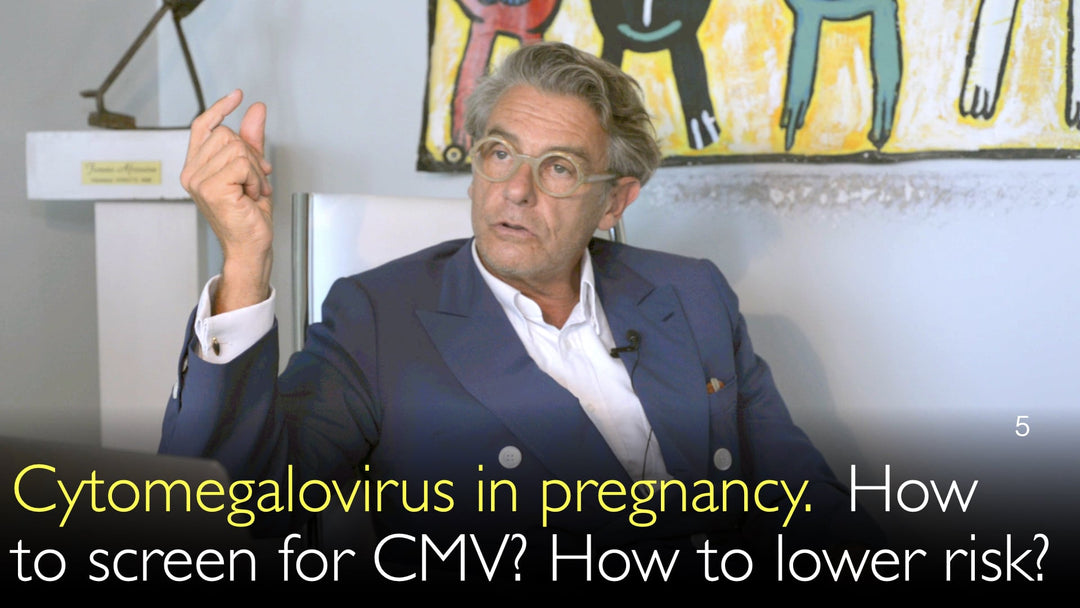Leading expert in maternal and fetal infections, Dr. Yves Ville, MD, explains cytomegalovirus (CMV) screening and prevention in pregnancy. He details how primary CMV infection is a major cause of congenital neurological problems. Dr. Ville outlines a two-step screening process using first-trimester serology. He discusses a major diagnostic advance using chorionic villus sampling (CVS) for early detection. Effective secondary prevention with antiviral medication like valacyclovir is also covered.
Cytomegalovirus (CMV) Screening and Prevention in Pregnancy: A Complete Guide
Jump To Section
- CMV Risk in Pregnancy and Congenital Effects
- Primary CMV Prevention Strategies
- CMV Screening and Diagnosis in the First Trimester
- CVS for Early CMV Diagnosis and Prognosis
- Antiviral Treatment for CMV in Pregnancy
- Future CMV Research and Vaccine Development
- Full Transcript
CMV Risk in Pregnancy and Congenital Effects
Cytomegalovirus (CMV) infection is a leading cause of congenital neurological problems in unborn children. Dr. Yves Ville, MD, describes CMV as the "new rubella" because its impact is significant now that rubella is largely controlled by vaccination. A primary CMV infection acquired at the beginning of pregnancy is the most dangerous. The rate of transmission from mother to fetus in these cases is high, at approximately 30%. The risk of severe sequelae for the fetus is also high, at about 30%, and can include brain damage and hearing loss.
Primary CMV Prevention Strategies
Primary prevention focuses on avoiding exposure to cytomegalovirus. Dr. Yves Ville, MD, emphasizes that a vaccine for CMV does not yet exist, though RNA vaccine technology offers hope for the future. The main strategy is to counsel pregnant women, especially those who work with young children, on rigorous hygiene practices. This is because young children are a common source of CMV. These preventive measures are crucial as they represent the first line of defense against a primary infection.
CMV Screening and Diagnosis in the First Trimester
Screening for cytomegalovirus is a key component of modern prenatal care. Dr. Yves Ville, MD, explains that screening involves a serology test in the first trimester to check for IgM and IgG antibodies. The presence of both IgG and IgM antibodies can testify to an early, primary CMV infection in pregnancy. This diagnosis is critical because it identifies the pregnancies at highest risk for severe fetal complications. This screening allows for the timely initiation of secondary prevention strategies.
CVS for Early CMV Diagnosis and Prognosis
A major diagnostic advance for cytomegalovirus involves chorionic villus sampling (CVS). Dr. Yves Ville, MD, details that if a woman has a primary infection at seven weeks, a CVS can be performed at 13 weeks to test the placenta. A negative CVS result is highly reassuring; it means the virus has not crossed the placenta and infected the fetus. Furthermore, Dr. Ville's research shows that if infection occurs after the first trimester, it does not damage the developing brain or hearing apparatus. This makes early diagnosis profoundly important for prognosis.
Antiviral Treatment for CMV in Pregnancy
Effective treatment for cytomegalovirus in pregnancy exists. Dr. Yves Ville, MD, states that the antiviral medication valacyclovir is used for secondary prevention. When given early, it can prevent the virus from crossing the placenta during the critical first trimester. This treatment is efficient and helps prevent the embryopathy associated with early CMV infection. For fetuses that are already severely infected, new, more potent antiviral drugs are currently under investigation in clinical trials led by experts like Dr. Ville.
Future CMV Research and Vaccine Development
The future of cytomegalovirus management looks promising. Dr. Yves Ville, MD, notes that the development of an effective CMV vaccine is a primary goal, with RNA vaccine technology being a leading candidate. Ongoing clinical trials are also focused on discovering more potent antiviral treatments for established fetal infections. A significant challenge remains the "black box" of non-primary CMV infections in immune women, for which reliable diagnostic methods are still needed. Dr. Anton Titov, MD, facilitates these important discussions to advance the field.
Full Transcript
Dr. Anton Titov, MD: You are an expert in maternal infections and fetal infections. Cytomegalovirus infection in pregnant women is one of the leading causes of congenital neurological problems in an unborn child. What is the best way to screen for cytomegalovirus infection in pregnant women? How to go about if the positive result in serology is known?
Dr. Yves Ville, MD: Cytomegalovirus for sure is the new rubella. Rubella is gone from most countries—unfortunately, not all countries—but rubella is gone in most countries because of vaccination. There is no vaccine yet for CMV. There are many hopes in RNA vaccine development now for all kinds of infection, especially CMV. At the moment, that does not exist.
So it's either primary prevention—not exposing the woman to CMV infection, young children—or secondary prevention after screening in the first trimester for serology IgM and IgG. If the presence of both IgG and IgM testifies for early infection in pregnancy, there is secondary prevention that is efficient with valacyclovir. It prevents the virus from crossing during the first trimester because it is an embryopathy that is a problem like rubella, not anything else.
The latest developments have occurred with cytomegalovirus CMV. CMV is worldwide. One of the main difficulties for CMV is that if you are immune, that does not protect you completely from another infection. And this non-primary CMV infection is a black box. Nobody knows how to diagnose that in the mother.
In Europe and the United States, especially the East Coast, these are mainly primary cytomegalovirus infections. So if you screen for cytomegalovirus early in pregnancy, and women do have a primary infection—which you diagnose by asking the serology—if they develop cytomegalovirus IgM and IgG early in pregnancy, these are the most dangerous infections because they are at the beginning of pregnancy or just before, pre-conceptional.
The rate of cytomegalovirus transmission is high. It is about 30%. And the risk of sequelae by damaging the embryo and then the fetus is high, also at 30%.
The latest developments have occurred from our group, both in early cytomegalovirus diagnosis. We can diagnose that with trophoblast biopsy CVS, chorionic villus sampling. It is a very early cytomegalovirus diagnosis. So if a woman, for example, gets a cytomegalovirus infection at seven weeks, you can do CVS at 13 weeks.
The good thing is that if that CVS is normal—negative—there is no cytomegalovirus infection on the placenta. There is no other way for the virus to cross the baby than crossing the placenta. So if the virus is not in the placenta, it means the cytomegalovirus infection has not occurred in the first trimester.
What we've clearly showed here is that if the cytomegalovirus infection occurs after that, there is no risk of abnormal development. That's a major advance because it's very reassuring. So you screen early, you exclude the diagnosis, and then that's fine.
There is no target for the virus after the first trimester if the virus can damage the hearing ability and damage the brain. If the cytomegalovirus infection happens after the first trimester, it does not hit the brain or the hearing process.
And if cytomegalovirus does happen early, you know it early also with the CVS diagnostic test, and you can treat. You can treat cytomegalovirus with antiviral drugs. One of the oldest, acyclovir or valacyclovir, is being given in pregnancy for herpes, for example. You can use that for CMV, and that works well if you treat early.
There are new drugs coming up. And we are conducting several clinical trials here to find an antiviral cytomegalovirus drug that is more potent for the severely cytomegalovirus-infected fetuses.







